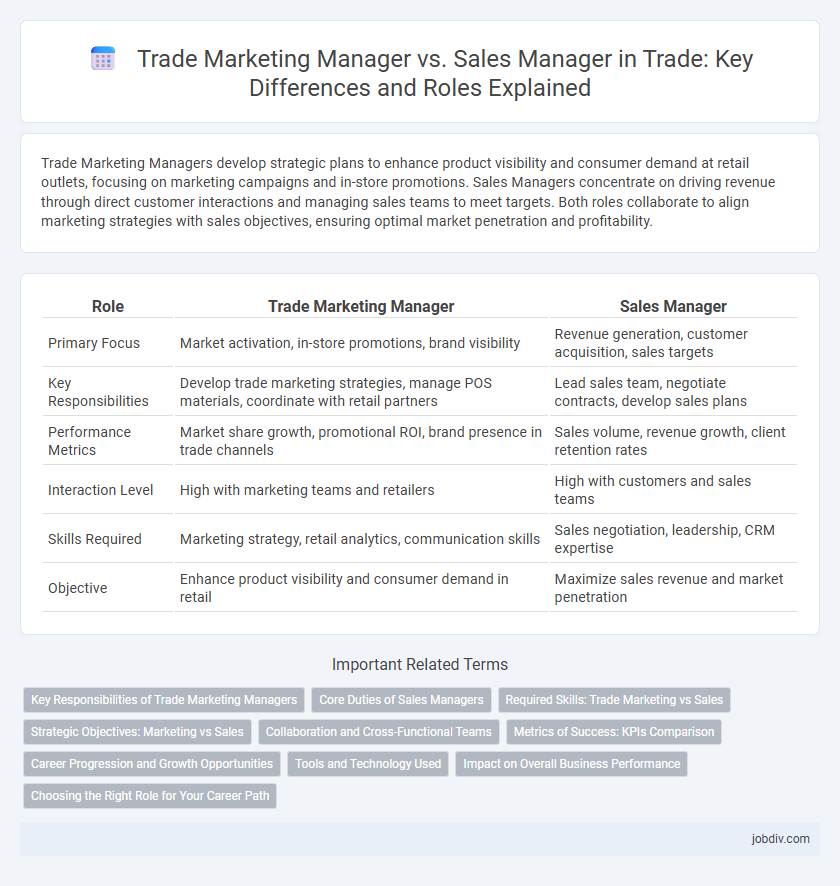Trade Marketing Managers develop strategic plans to enhance product visibility and consumer demand at retail outlets, focusing on marketing campaigns and in-store promotions. Sales Managers concentrate on driving revenue through direct customer interactions and managing sales teams to meet targets. Both roles collaborate to align marketing strategies with sales objectives, ensuring optimal market penetration and profitability.
Table of Comparison
| Role | Trade Marketing Manager | Sales Manager |
|---|---|---|
| Primary Focus | Market activation, in-store promotions, brand visibility | Revenue generation, customer acquisition, sales targets |
| Key Responsibilities | Develop trade marketing strategies, manage POS materials, coordinate with retail partners | Lead sales team, negotiate contracts, develop sales plans |
| Performance Metrics | Market share growth, promotional ROI, brand presence in trade channels | Sales volume, revenue growth, client retention rates |
| Interaction Level | High with marketing teams and retailers | High with customers and sales teams |
| Skills Required | Marketing strategy, retail analytics, communication skills | Sales negotiation, leadership, CRM expertise |
| Objective | Enhance product visibility and consumer demand in retail | Maximize sales revenue and market penetration |
Key Responsibilities of Trade Marketing Managers
Trade Marketing Managers focus on developing and executing marketing strategies tailored to retail environments, optimizing product placement, in-store promotions, and shopper engagement to boost brand visibility and sales. They collaborate closely with sales teams to align marketing campaigns with sales goals, analyze market trends, and monitor competitor activities to enhance promotional effectiveness. Their responsibilities include managing trade budgets, coordinating with distributors, and conducting performance analysis to maximize return on investment in trade channels.
Core Duties of Sales Managers
Sales Managers focus on driving revenue growth by developing strategic sales plans, managing sales teams, and building strong client relationships to meet targets. They analyze market trends and customer needs, optimize sales processes, and ensure consistent achievement of sales goals across regions. Core duties include forecasting sales, negotiating contracts, and coordinating with marketing to align promotional activities with sales objectives.
Required Skills: Trade Marketing vs Sales
Trade Marketing Managers require strong analytical skills, expertise in market research, and proficiency in developing promotional strategies tailored to retail environments to maximize product visibility and consumer engagement. Sales Managers need excellent negotiation abilities, client relationship management, and leadership skills to drive sales targets, motivate teams, and close deals effectively. Both roles demand strategic planning and communication skills, but Trade Marketing emphasizes consumer insights and brand activation, while Sales focuses on revenue generation and direct customer interaction.
Strategic Objectives: Marketing vs Sales
Trade Marketing Managers focus on developing and executing strategies that increase product visibility and brand presence within retail environments, driving consumer demand through promotional activities and supply chain collaboration. Sales Managers prioritize achieving revenue targets by managing sales teams, building customer relationships, and optimizing sales processes to close deals and expand market share. The strategic objective of Trade Marketing centers on market penetration and brand positioning, while Sales emphasizes direct customer acquisition and revenue growth.
Collaboration and Cross-Functional Teams
Trade Marketing Managers and Sales Managers collaborate closely to align marketing strategies with sales objectives, ensuring cohesive execution of promotional campaigns. Their partnership within cross-functional teams integrates market insights and customer feedback, optimizing product placement and driving revenue growth. Effective communication between these roles enhances supply chain coordination and accelerates decision-making processes.
Metrics of Success: KPIs Comparison
Trade Marketing Managers prioritize KPIs such as in-store promotion performance, shelf share growth, and consumer engagement metrics to drive brand visibility and shopper conversion. Sales Managers focus on metrics like sales volume, revenue targets, market share growth, and pipeline conversion rates to ensure meeting overall sales goals. Comparing these KPIs highlights how Trade Marketing leverages shopper insights and activation effectiveness, whereas Sales Management emphasizes deal closures and revenue generation.
Career Progression and Growth Opportunities
Trade Marketing Managers often advance by expanding their expertise in market analysis and strategic campaign development, enabling them to take on roles such as Brand Director or Category Manager. Sales Managers typically progress by enhancing their client management and negotiation skills, leading to positions like Regional Sales Director or Vice President of Sales. Career growth in Trade Marketing emphasizes cross-functional collaboration and data-driven decision making, whereas Sales Manager advancement relies on performance metrics and team leadership.
Tools and Technology Used
Trade Marketing Managers leverage advanced analytical tools, CRM platforms, and digital marketing software to design data-driven campaigns targeting retail channels. Sales Managers utilize sales automation systems, forecasting tools, and mobile CRM applications to streamline sales processes and manage client relationships effectively. Both roles depend on integrated technology solutions, but Trade Marketing prioritizes market analytics while Sales focuses on real-time customer interaction.
Impact on Overall Business Performance
A Trade Marketing Manager drives overall business performance by developing targeted promotional strategies that increase product visibility and consumer demand at the point of sale. A Sales Manager directly influences revenue generation by managing sales teams, overseeing client relationships, and achieving sales targets. Both roles are critical, with Trade Marketing enhancing market presence and Sales Management ensuring execution and revenue growth.
Choosing the Right Role for Your Career Path
Trade Marketing Managers develop strategies to enhance product visibility and shelf presence, driving consumer demand through promotions and in-store activations; this role requires strong analytical skills and collaboration with marketing teams. Sales Managers focus on managing sales processes, building client relationships, and meeting revenue targets by leading sales teams and negotiating deals. Choosing the right role depends on whether you prefer strategic market positioning and consumer insights (Trade Marketing) or direct customer interaction and sales operations (Sales Management).
Trade Marketing Manager vs Sales Manager Infographic

 jobdiv.com
jobdiv.com